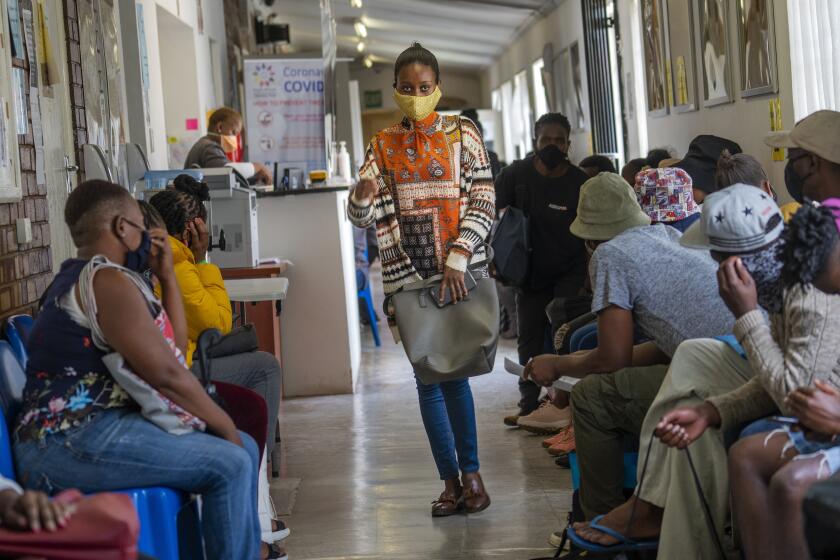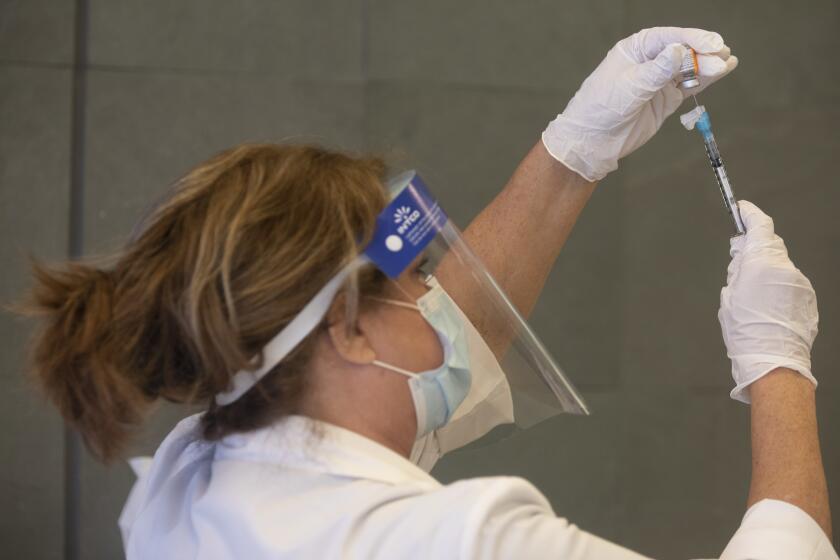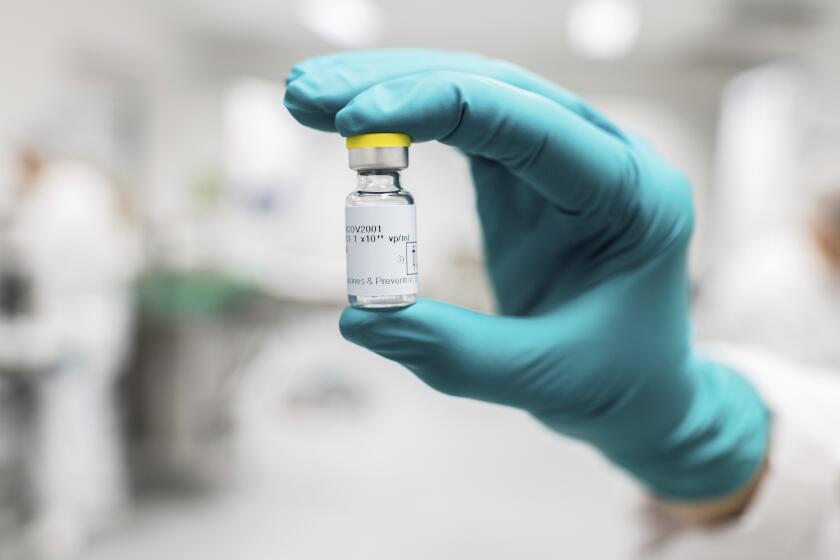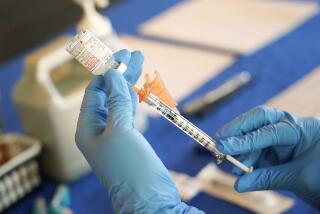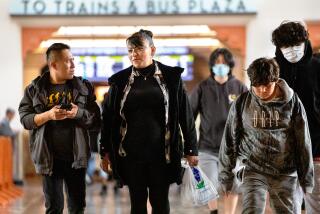Johnson & Johnson one-dose vaccine offers safe, effective COVID-19 protection, FDA says
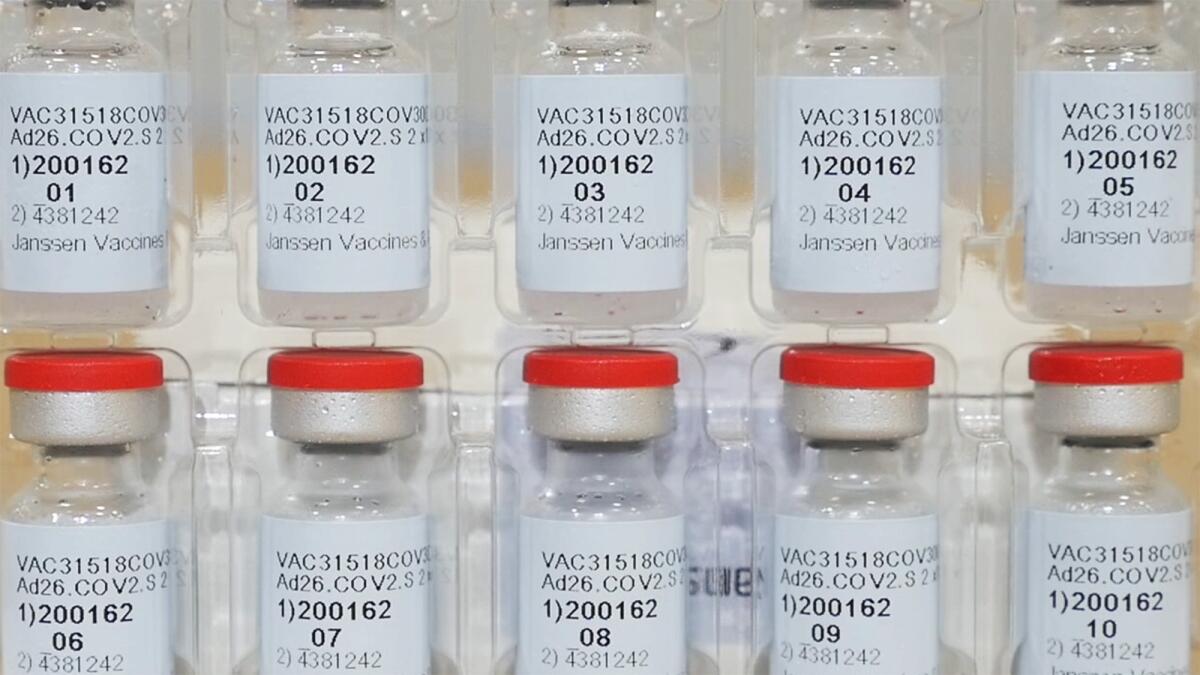
- Share via
WASHINGTON — Johnson & Johnson’s single-dose vaccine offers strong protection against severe cases of COVID-19, according to an analysis released Wednesday by U.S. regulators that sets the stage for emergency use authorization of a new and easier-to-use shot to help tame the pandemic.
Scientists at the Food and Drug Administration confirmed that, overall, the vaccine is about 66% effective at preventing moderate to severe COVID-19, and about 85% effective at preventing the most serious illness. The FDA review also said the shot — one that could help speed vaccinations by requiring just one dose instead of two — is safe to use.
That’s just one step in the FDA’s evaluation of a third vaccine option for the U.S. On Friday, an independent advisory panel will debate whether the evidence is strong enough to recommend the long-anticipated shot developed by J&J’s Janssen Biotech unit. After the advisory panel weighs in, a decision by the FDA on whether to authorize the vaccine is expected within days.
The vaccination drive has been slower than hoped, hampered by logistical issues and weather delays even as the country mourns more than 500,000 COVID-19 deaths. About 44.5 million Americans have received at least one dose of vaccine made by Pfizer and BioNTech or Moderna, and nearly 20 million of them have received the second dose required for full protection.
Johnson & Johnson tested its single-dose option in 44,000 adults in the U.S., Latin America and South Africa. Different variants of the coronavirus are circulating in different countries, and the FDA analysis cautioned that it’s not clear how well the vaccine works against each one. But J&J previously announced that the vaccine worked better in the U.S.: It was 72% effective against moderate to severe COVID-19 there, compared with 66% in Latin America and 57% in South Africa, where a vaccine-resistant strain is the dominant one in circulation.
A poor showing by a COVID-19 vaccine from AstraZeneca and Oxford University prompted South African health officials to shelve plans to inoculate health workers.
Still, South Africa recently began giving the J&J vaccine to front-line health workers on a test basis after deciding that another COVID-19 vaccine developed by AstraZeneca and Oxford University hadn’t shown strong enough study results.
The FDA analysis found that, across all countries, protection from the J&J vaccine began to emerge about 14 days after vaccination. By 28 days, there were no hospitalizations or deaths in the vaccinated group compared with 16 hospitalizations and seven deaths in study recipients who received a placebo shot.
The FDA said effectiveness and safety were consistent across racial groups, including Black and Latino participants.
Although the overall data may suggest the Johnson & Johnson candidate isn’t quite as effective as the two-dose Pfizer and Moderna options, all of the world’s COVID-19 vaccines have been tested under different conditions, making direct comparisons nearly impossible. It wouldn’t be surprising if one dose turns out to be a little weaker than two doses, and policymakers will decide if that’s an acceptable trade-off to get more people vaccinated faster.
When getting vaccinated against COVID-19, there’s no sense being picky about your shot. Experts say you should take the first authorized vaccine that’s offered.
Like other COVID-19 vaccines, the main side effects of the J&J shot are pain at the injection site and flu-like fever, fatigue and headache. None of the study participants experienced the severe allergic reaction, called anaphylaxis, that is a rare risk of some other COVID-19 shots, although one experienced a less serious reaction.
The FDA said there were no serious side effects linked to the vaccine so far, although it recommended further monitoring for blood clots. In the study, those were reported in about 15 vaccine recipients and 10 placebo recipients — not enough of a difference to tell whether the vaccine played any role.
Johnson & Johnson was on track to become the world’s first one-dose option until earlier this month, when Mexico announced that it would use a one-dose version from China’s CanSino. That vaccine is made with similar technology as Johnson & Johnson’s but initially was developed as a two-dose option until beginning a one-dose test in the fall.
The J&J vaccine didn’t appear to perform as well as others in clinical trials. But scientists say it is impossible to know whether any one vaccine is better.
The Pfizer and Moderna vaccines now being used in the U.S. and numerous other countries must be kept frozen, while the J&J shot can last three months in a refrigerator, making it easier to handle. AstraZeneca’s vaccine, widely used in Europe, Britain and Israel, is made similarly and also requires refrigeration but takes two doses.
If the FDA clears the Johnson & Johnson shot for U.S. use, it won’t boost vaccine supplies significantly right away. Only a few million doses are expected to be ready for shipping in the first week. But J&J told Congress this week that it expected to provide 20 million doses by the end of March and 100 million by summer.
European regulators and the World Health Organization also are considering Johnson & Johnson’s vaccine. Worldwide, the company aims to be producing around a billion doses by the end of the year.
More to Read
Sign up for Essential California
The most important California stories and recommendations in your inbox every morning.
You may occasionally receive promotional content from the Los Angeles Times.
